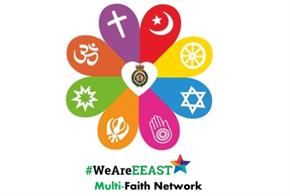
We recently celebrated Easter and this year’s was particularly special. This year has been the first time in 33 years, that three important religious holidays took place at the same time. Christians celebrated Easter, Jews commemorate Passover, and Muslims observed the holy month of Ramadan, all overlapping each other between 5th April – 21st April 2023.
As a devoted Christian, all be it with many weaknesses, shortcoming, and faults, I wanted to better understand what this year’s religious festivals meant to these different faiths – particularly as we cover such a range of communities within the EEAST region and within our workforce.
From a Jewish perspective the Torah talks about the first pass-over (Exodus 12) when the Israelites were told to mark the posts of their front door in blood, to signal to the angel of the Lord, to pass-over such a house so that they would be exempt from the sacrifice of their firstborn children. This established the Jewish festival of the pass-over during which time they observe a seder which is a religious dinner combining food, song, and storytelling.
For Christians, the Lord Jesus Christ was crucified and resurrected during the pass-over, to free humanity from sin so “that everyone who believes in Him may have eternal life. For God so loved the world, that He gave His only begotten Son, that whoever believes in Him shall not perish but have eternal life.” (John 3 : 14-16) Thus, the original pass-over in Jewish tradition, became Easter in the Christian tradition.
In Islam, the ninth month of the Islamic calendar is the holy month of Ramadan during which Allah is said to have revealed the first verses of the Koran, the Islamic holy book, to the Prophet Muhammad. Because Muslims use a lunar calendar rather than the Gregorian one Ramadan starts on a different day every year. Ramadan is traditionally a period of fasting from dawn to sunset during which people reflect, purify the soul and bring themselves closer to Allah. At sunset each day, the faithful are permitted to break their fast with a meal called iftar, ending what can be a gruelling stretch of hours without food and water—especially when Ramadan falls during the long days of summer.
Originally both Passover and Easter were supposed to fall on, or near, a full moon in the Spring, following the same Jewish calendar. However, in AD 325 the Church decided that Easter would be celebrated on the first Sunday after the first full moon after 21 March. So, quite often this isn’t at the same time when Jews celebrate the Passover.
Whilst all the above may make for interesting reading, a bit of history possibly…my point is that it is important to understand that within each religion, the traditions, rituals, and practices are sacred and very important to individual followers.
As a Christian I do not need to justify why I describe myself as a Christian, or why I do what I do during my religious festivals. It is my faith; it is my belief. I believe, because I believe, and I cannot always explain exactly why I believe. I am a work in progress.
Regardless of whether you practice your faith, or have none, within the working environment, it is important that everyone is able to bring their full self to work. So let’s foster an inclusive working environment, where we are value people’s faith – or lack of it – so everyone is valued, seen and heard.
Sweet Pesach, Happy Easter, and Blessed Ramadan to you all.
Dr Hein Scheffer, Executive Director Strategy, Culture & Education
This is the first of a regular monthly blog from Dr Hein Scheffer on Equalities & Diversity issues.
If you would like to know more about the Multi Faith Network please email multifaith@eastamb.nhs.uk or contact the chair, Simon King.
Published 12th April 2023